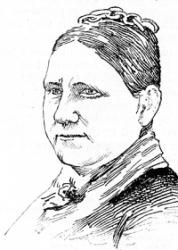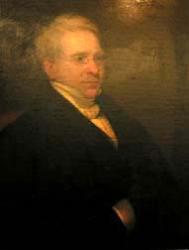Planning worship?
Check out our sister site, ZeteoSearch.org,
for 20+ additional resources related to your search.
- |
User Links
Person Results
‹ Return to hymnal


Export as CSV
Joseph A. Alexander
1809 - 1860 Person Name: J. A. Alexander Hymnal Number: 479 Author of "There is a line, by us unseen" in Songs for the Sanctuary; or Psalms and Hymns for Christian Worship (Baptist Ed.) Alexander, Joseph Addison, D.D., brother of Dr. J. W. Alexander, and a minister of the Presbyterian Church, born in Philadelphia, April 24, 1809, graduated at Princeton, 1826, became Adjunct Professor of Latin, 1833, and Associate Professor of Biblical Literature, 1838, died at Princeton, Jan. 28, 1860. Dr. Alexander was a great Hebraist, and published Commentaries on Isaiah, the Psalms, &c. His poem, “The Doomed Man,” was written for, and first published in, the Sunday School Journal, Phila., April 5, 1837. It has striking merit, but moves in one of those doctrinal circles which hymns generally avoid. Parts of it are found as hymns in a few Calvinistic collections, as, "There is a time, we know not when," in the New York Church Praise Book, 1881, No. 288. This is sometimes given with the second stanza, "There is a line, by us unseen," as in Nason's Collection, and Robinson's Songs for the Sanctuary, 1865. Unknown to English collections. [Rev. F. M. Bird, M.A.]
--John Julian, Dictionary of Hymnology, p. 39 (1907)
Joseph A. Alexander
A. S. Barnes & Co.
Publisher of "" in Songs for the Sanctuary; or Psalms and Hymns for Christian Worship (Baptist Ed.) New York
A. S. Barnes & Co.
J. B. Waterbury
1799 - 1876 Person Name: Jared Bell Waterbury Hymnal Number: 470 Author of "Infinite love, what precious stores" in Songs for the Sanctuary; or Psalms and Hymns for Christian Worship (Baptist Ed.) Waterbury, Jared Bell, D.D., was born in New York City, Aug. 11, 1799, and graduated at Yale College, 1822. He was for some time pastor of a Congregational church at Hudson, New York, and then of Bowdoin Street Congregational church, Boston. He died at Brooklyn, Dec. 31, 1876. He published Advice to a Young Christian; The Officer on Duty, and other works. To the Rev. J. Leavitt's Christian Lyre, vol. i., 1830, he contributed the following hymns, each of which was headed, "Written for the Lyre," and signed "J. B. W.":—
1. My Jesus, Thou hast taught. The Love of Jesus.
2. Met, O God, to ask Thy presence. Repentance.
3. 0 fly, mourning sinner, saith Jesus to me. Promise of Pardon.
4. See Sodom wrapt in fire. Warning.
5. Sinner, is thy heart at rest? The Voice of Conscience.
6. Soldiers of the Cross, arise! Lo! your Leader from the skies. Soldiers of the Cross.
7. When, O my Saviour, shall this heart? Desiring Jesus.
In vol. ii. of the same work, 1830, also:--
8. I have fought the good fight; 1 have finished my race. Martyr's Death Song.
Another of his hymns is given in the Songs for the Sanctuary, 1865, as:—
9. Infinite love, what precious stores. Riches of Divine Grace. Sometimes dated 1862.
Of these hymns, Nos. 5, 6, and 9 are the best known. [Rev. F. M. Bird, M.A.]
-- John Julian, Dictionary of Hymnology (1907)
J. B. Waterbury
Eliel Davis
1803 - 1849 Hymnal Number: 74 Author of "From every earthly pleasure" in Songs for the Sanctuary; or Psalms and Hymns for Christian Worship (Baptist Ed.) Davis, Eliel, was born at Folkestone, June 5, 1803. In 1822 he entered a business establishment in London, and joined the Baptist church in Eagle Street. Entering the Baptist Ministry he was successively pastor at Newport, Isle of Wight; Regent Street, Lambeth, London; Eye, in Suffolk; and St. Ives, in Huntingdonshire. He died in March, 1849. His hymn "From every earthly pleasure" (Onward) was contributed to ms. monthly magazine, in 1821, edited by Dr. Belcher, author of Historical Sketches of Hymns, and through Dr. Belcher's influence was published in The New Baptist Magazine, March, 1825, in 6 stanzas of 4 lines. It is found, usually abridged, in several modern collections. Another of his hymns "There is a heaven of perfect peace" (Heaven Anticipated), appeared in the Supplement to the Evangelical Magazine, 18(5, and is also in common use. [Rev. W. R. Stevenson, M.A.]
--John Julian, Dictionary of Hymnology, Appendix, Part II (1907)
Eliel Davis
Grace W. Hinsdale

1833 - 1902 Hymnal Number: 1294 Author of "A light streams downward from the sky" in Songs for the Sanctuary; or Psalms and Hymns for Christian Worship (Baptist Ed.) Hinsdale, Grace Webster, née Haddock, a Congregationalism daughter married to Theodore Hinsdale, a lawyer of New York, in 1850. Mrs. Hinsdale is a contributor to the periodical press, and has published Coming to the King, a Book of Daily Devotion for Children, 1865; republished in England as Daily Devotions for Children, 1867. Her hymns include :—
i. From Coming to the King, 1865.
1. A light streams downward from the sky. Heaven.
2. My soul complete in Jesus stands (1855). Safety in Jesus.
ii. From Schaff’s Christ in Song, N.Y., 1869.
3. Are there no wounds for me? Passiontide. Written April, 1868.
4. Jesus, the rays divine. Jesus ever present. Written July, 1868.
5. There was no angel 'midst the throng. Jesus, the Deliverer; or, Redemption. Written April, 1868. The hymn, "Jesus, Thou art my Lord, my God,” in the 1874 Supplement to the New Congregational Hymn Book, is composed of st. viii.-x., xv.-xvii., slightly altered, of this hymn.
6. Thou stand'st between the earth and heave. Virgin and Child. This poem was "written after viewing Raphael's Madonna di San Sisto, in the Royal Gallery of Dresden, Aug., 1867." (Christ in Song.) It is not suited for congregational use.
Her pen name is "Farin."
-- John Julian, Dictionary of Hymnology
Grace W. Hinsdale
Roswell Park
1807 - 1869 Person Name: R. Park Hymnal Number: 1093 Author of "Jesus spreads his banner o'er us" in Songs for the Sanctuary; or Psalms and Hymns for Christian Worship (Baptist Ed.) Park, Roswell, D.D., of the Protestant Episcopal Church, was born at Lebanon, Connecticut, Oct. 1, 1807, and educated at Union College and West Point. Previous to receiving Holy Orders he was in the army, and also held the appointment of Professor of Chemistry in the University of Pennsylvania. He was ordained in 1843, was President of Racine College, Wisconsin (1852-59), Chancellor of the same College (1858-63); and Principal of a school in Chicago from 1863 to his death. He died at Chicago, July 16, 1869. He published Sketch of West Point, 1840; Pantology, 1841; Handbook for European Travel, 1853; and Poems, 1836. His best known hymn is for Holy Communion. It begins "Jesus spreads His banner o'er us," and was published in his Poems, 1836. It is in common use in Great Britain and America. [Rev. F. M. Bird, M.A.]
-- John Julian, Dictionary of Hymnology (1907)
Roswell Park
G. A. Stearns
Hymnal Number: 507 Author of "Will you go, will you go" in Songs for the Sanctuary; or Psalms and Hymns for Christian Worship (Baptist Ed.)
G. A. Stearns
Nathan S. S. Beman

1785 - 1871 Person Name: N. S. S. Beman Hymnal Number: 536 Author of "Jesus, I come to thee, A sinner doomed to die" in Songs for the Sanctuary; or Psalms and Hymns for Christian Worship (Baptist Ed.) Beman, Nathan Sidney Smith, D.D., was born at Canaan, Columbia Co., N. Y., Nov. 27, 1785; and graduated at Middleburg College, Vermont, 1807. He was a Congregational Pastor at Portland, Maine, 1810-12; Minister in Georgia, 1812-22; and Pastor of the First Presbyterian Church, Troy, N. Y., 1823-63. He died at Carbondale, Illinois, Aug. 8, 1871. He edited Sacred Lyrics, Troy, 1832, and an enlarged collection under the same title, 1841. The latter was adopted by the New School Presbyterian General Assembly as the Church Psalmist, 1847. Dr. Beman is known in hymnody mainly through his three hymns which are in common use:—
1. Jesus, we bow before Thy throne. Missions. This appeared in Dr. Hastings's Spiritual Songs, 1831, No. 174, in 4 stanzas of 4 lines.
2. Jesus, I come to Thee. Submission to Christ.
3. Hark, the judgment trumpet sounding. Judgment.
The last two were first published in his Sacred Lyrics, 1832, and all are given in Dr. Hatfield's Church Hymn Book, 1872. Dr. Beman's hymns are unknown to English collections. [Rev. F. M. Bird, M.A.]
-- John Julian, Dictionary of Hymnology (1907)
Nathan S. S. Beman
William Maxwell
1801 - 1900 Hymnal Number: 1082 Author of "Jesus, Master, hear me now" in Songs for the Sanctuary; or Psalms and Hymns for Christian Worship (Baptist Ed.)
William Maxwell


 My Starred Hymns
My Starred Hymns


